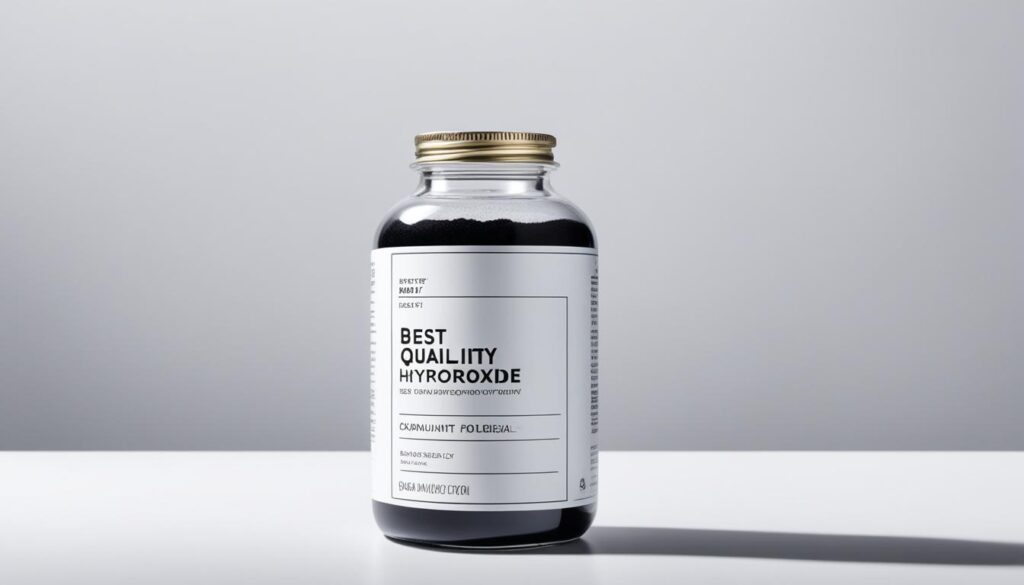Potassium hydroxide (KOH) is an inorganic compound commonly known as caustic potash. It is used in various industries due to its versatile properties and benefits. KOH is a potent base that is marketed in different forms, such as pellets, flakes, and powders. It is widely used in chemical, industrial, manufacturing, and pharmaceutical applications. In the food industry, potassium hydroxide is used to adjust pH, act as a stabilizer, and as a thickening agent. It is also used in soap-making, alkaline batteries, electroplating, and lithography. Medically, it is used for microscopic visualization of fungi and fungal elements in clinical specimens. Recent studies have also shown its efficacy in the treatment of warts.
Key Takeaways:
- Potassium hydroxide, also known as caustic potash, is an inorganic compound with versatile properties.
- It is used in various industries, including chemical, industrial, manufacturing, and pharmaceutical applications.
- In the food industry, potassium hydroxide is used for pH adjustment, stabilization, and thickening.
- It finds applications in soap-making, alkaline batteries, electroplating, lithography, and clinical microscopy.
- Potassium hydroxide has shown promising results in the treatment of warts.
Potassium Hydroxide in Cosmetics

Potassium hydroxide (KOH) finds wide-ranging applications in the cosmetic industry, thanks to its versatile properties. This compound plays a crucial role in the production of soaps, detergents, washing liquids, and bleaches.
One of the primary uses of potassium hydroxide in cosmetics is as a pH adjuster. It enables cosmetic products to achieve the desired pH level, ensuring their effectiveness and stability. This ability to regulate pH is particularly important for skincare and haircare products, as the optimal pH level enhances their efficacy and promotes a favorable environment for healthy skin and hair.
Potassium hydroxide is also employed as a thickening agent in cosmetics, lending creams, lotions, and other formulations a desirable consistency. This attribute allows for improved texture and easier application, enhancing the overall user experience.
It is worth mentioning that potassium hydroxide finds applications beyond cosmetics. This compound is also utilized in the manufacturing of medical products, dyes, and laboratory reagents, further highlighting its versatility and significance in various industries.
As an industry expert, I believe that potassium hydroxide’s multifaceted applications in cosmetics are a testament to its effectiveness and adaptability. From pH adjustment to thickening, this compound adds value to cosmetic formulations, contributing to the creation of high-quality products that meet consumer expectations. With its diverse range of applications, potassium hydroxide continues to be an indispensable ingredient in the cosmetic industry.
Potassium Hydroxide in Soap Making

Potassium hydroxide plays a crucial role in the soap-making process. It is used to saponify fats and oils, converting them into soap. When mixed with water and oils, potassium hydroxide initiates a chemical reaction called saponification, which results in the formation of soap. This process is commonly used in the production of liquid soaps and specialty soaps.
Table: Comparison of Potassium Hydroxide and Sodium Hydroxide in Soap Making
| Potassium Hydroxide | Sodium Hydroxide |
|---|---|
| Used for making liquid soaps and specialty soaps | Used for making bar soaps |
| Requires less water during the soap-making process | Requires more water during the soap-making process |
| Results in a softer texture of soap | Results in a harder texture of soap |
When compared to sodium hydroxide, potassium hydroxide is preferred for producing liquid soaps and specialty soaps. It requires less water during the soap-making process, resulting in a softer texture of soap. On the other hand, sodium hydroxide is commonly used for making bar soaps and requires more water, resulting in a harder texture of soap.
Potassium Hydroxide in Agriculture
Potassium hydroxide plays a vital role in the agricultural industry, serving as a valuable source of potassium, which is an essential nutrient for plant growth. With its alkaline properties, potassium hydroxide is commonly used as a liquid fertilizer to supply plants with the necessary potassium needed for their development. This nutrient promotes root development, enhances fruit yield, and improves the overall quality of crops.
Additionally, potassium hydroxide can be used to adjust soil pH, ensuring the optimal conditions for plant growth. Many plants thrive in specific pH ranges, and potassium hydroxide can help create and maintain the ideal pH level. By balancing the soil’s acidity or alkalinity, potassium hydroxide assists in nutrient absorption, maximizing plant growth and productivity.
When using potassium hydroxide in agriculture, it is crucial to follow recommended application rates to prevent overuse or potential harm to plants. Consulting with agricultural experts or conducting soil tests can provide valuable insights into the appropriate dosage and timing for potassium hydroxide application.
Benefits of Potassium Hydroxide in Agriculture:
Potassium hydroxide offers several benefits in agriculture, including:
- Enhanced plant growth and development due to potassium supplementation
- Improved fruit quality, size, and yield
- Optimized nutrient absorption through proper pH adjustment
- Increased plant resistance to disease and stress
By incorporating potassium hydroxide into agricultural practices, farmers can promote healthier plants, improve crop yields, and contribute to sustainable agriculture.
Comparison of Potassium Fertilizers
| Fertilizer | Potassium Content (%) | Application Method | Advantages |
|---|---|---|---|
| Potassium Hydroxide (KOH) | 50-60% | Liquid application to soil | Quick release of potassium, suitable for foliar application |
| Potassium Chloride (KCl) | 50-60% | Granular application to soil | Cost-effective, commonly used potassium source |
| Potassium Nitrate (KNO3) | 13-46% | Foliar application or soil incorporation | Promotes nitrogen uptake alongside potassium |
Table: Comparison of Potassium Fertilizers
Source: https://seowriting.ai/32_6.png
Potassium Hydroxide in Chemical Synthesis

Potassium hydroxide (KOH) plays a pivotal role in chemical synthesis, owing to its strong alkalinity and reactivity. As a catalyst and reagent, it enables the formation of desired compounds in various chemical reactions, making it a valuable tool in the pharmaceutical, dye, and chemical industries.
When utilized as a catalyst, potassium hydroxide accelerates the speed of reactions without undergoing any permanent chemical changes itself. This property makes it an essential component in the production of pharmaceutical drugs, where precise control over reaction kinetics is crucial for yield and efficiency. Additionally, potassium hydroxide serves as a key catalyst in the synthesis of dyes, enabling the formation of vibrant and stable colorants used in textiles, inks, and coatings.
In addition to catalysis, potassium hydroxide also acts as a reagent in chemical synthesis. By reacting with other compounds, it undergoes chemical transformations that are essential for the creation of complex molecules. This reactivity is particularly valuable in the synthesis of organic intermediates and specialty chemicals, where potassium hydroxide can initiate crucial steps in the overall synthesis pathway.
Examples of Potassium Hydroxide in Chemical Synthesis:
- Synthesis of pharmaceutical intermediates: Potassium hydroxide is employed in the synthesis of various pharmaceutical intermediates, enabling the production of essential components for drugs used in treatments for diseases such as cancer, cardiovascular disorders, and infectious diseases.
- Manufacturing of specialty chemicals: Potassium hydroxide serves as a reagent in the production of specialty chemicals used in diverse industries, including agriculture, electronics, and polymers. These chemicals find applications in crop protection, semiconductor manufacturing, and materials engineering, respectively.
- Dye synthesis: Potassium hydroxide is utilized in the synthesis of dyes, facilitating the formation of chromophores that impart vivid colors to textiles, paints, and inks. This enables the production of a wide spectrum of pigments with different hues and properties.
Overall, potassium hydroxide’s ability to catalyze reactions and act as a reagent in chemical synthesis processes makes it an indispensable tool for creating a wide range of compounds. Its versatility and effectiveness have contributed to its widespread use in numerous industries, driving advancements in pharmaceuticals, dyes, and specialty chemicals.
| Advantages of Potassium Hydroxide in Chemical Synthesis | Applications |
|---|---|
| Strong alkalinity | Catalysis in pharmaceutical synthesis |
| High reactivity | Specialty chemical production |
| Versatile application | Synthesis of dyes |
Potassium Hydroxide for pH Adjustment

One of the key uses of potassium hydroxide is for pH adjustment. It is commonly used in various industries, including food production and cosmetics, to regulate the acidity or alkalinity of products. Potassium hydroxide can be added in controlled amounts to achieve the desired pH level, ensuring the stability and effectiveness of the final product.
The pH level of a substance plays a crucial role in determining its properties and functionality. Whether it’s a skincare product, a food item, or a chemical solution, maintaining the appropriate pH is essential for optimal performance and consumer satisfaction. Potassium hydroxide, with its strong alkaline nature, offers a reliable and efficient solution for pH adjustment.
In the food industry, potassium hydroxide is used to regulate the pH of various products. It provides the necessary alkalinity to achieve the desired taste, color, and texture. For example, in the production of certain dairy products like cheese and yogurt, potassium hydroxide helps control acidity levels, ensuring proper fermentation and improving the overall quality of the final product.
Similarly, in the cosmetics industry, potassium hydroxide serves as a pH adjuster for a wide range of products. It is commonly used in skincare formulations, such as creams, serums, and cleansers, to balance the acidity and maintain the skin’s natural pH. By adjusting the pH, potassium hydroxide helps preserve the stability and efficacy of the product, ensuring optimal performance and desired outcomes.
“Potassium hydroxide is a versatile compound that allows us to fine-tune the pH of our skincare products, ensuring they provide the optimal environment for healthy skin.”
Along with its pH adjustment properties, potassium hydroxide also offers other benefits in cosmetic formulations. It acts as a thickening agent, enhancing the consistency and texture of the product. Additionally, it can improve the solubility of certain ingredients, facilitating their incorporation into the formulation.
Table: Examples of pH Adjustment Applications in Various Industries
| Industry | Product | Application |
|---|---|---|
| Food | Yogurt | Controlling acidity levels for proper fermentation |
| Cosmetics | Face cream | Maintaining skin’s natural pH for optimal performance |
| Pharmaceutical | Solution for eye drops | Adjusting pH for comfort and safety |
| Chemical | Laboratory reagents | Ensuring accuracy in chemical reactions |
The versatility and effectiveness of potassium hydroxide make it an essential ingredient in many industries. Its ability to adjust pH levels helps manufacturers create products with enhanced stability, improved performance, and desirable characteristics.
Other Applications of Potassium Hydroxide
Potassium hydroxide has a wide range of applications beyond pH adjustment. In chemical synthesis, it serves as a catalyst or reagent, facilitating various chemical reactions. It is utilized in the production of pharmaceuticals, dyes, and other chemical compounds.
Furthermore, potassium hydroxide plays a significant role in soap making. It is used in the saponification process, where it reacts with fats and oils to produce soap. This process is commonly employed in the production of specialty soaps and liquid soaps.
Overall, potassium hydroxide’s versatility and properties make it an invaluable compound in numerous industries, enabling pH adjustment and contributing to the development of high-quality, effective, and safe products.
Potassium Hydroxide in Food Production

Potassium hydroxide plays a crucial role in the food production industry. Its versatile properties and functions make it a valuable ingredient in various processed food products. Here’s how potassium hydroxide is used in food production:
Acidity Regulation and Stabilization
Potassium hydroxide acts as an acidity regulator and stabilizer in processed food, ensuring the desired pH level and improving overall product quality. It helps maintain the right balance of acidity or alkalinity, enhancing flavor, texture, and shelf life of confectionery, preserves, cocoa, and dietary supplements.
Thickening Agent
Potassium hydroxide also serves as a thickening agent in certain food products. Its chemical properties allow it to modify the viscosity and consistency of sauces, dressings, and other culinary creations. This ensures a smooth and appealing texture, enhancing the overall eating experience.
Safety and Regulatory Compliance
It’s important to note that potassium hydroxide is generally recognized as safe by the Food and Drug Administration (FDA) for direct use in food products. Its application in the food industry complies with strict regulations and guidelines to ensure consumer safety.
To summarize, potassium hydroxide is widely used in food production as an acidity regulator, stabilizer, and thickening agent. Its versatility and safety make it a valuable ingredient for enhancing the quality, flavor, and shelf life of various processed food products.
| Application | Function |
|---|---|
| Confectionery | Acidity regulation, stabilization |
| Preserves | Acidity regulation, stabilization |
| Cocoa | Acidity regulation, stabilization |
| Dietary Supplements | Acidity regulation, stabilization |
| Sauces | Thickening agent |
| Dressings | Thickening agent |
Potassium Hydroxide Benefits and Application

Potassium hydroxide (KOH) is a versatile compound that offers numerous benefits and applications across various industries. Its unique properties make it a valuable ingredient in many processes and products.
Benefits of Potassium Hydroxide
One of the key benefits of potassium hydroxide is its ability to adjust pH levels. This makes it an essential component in industries such as food production and cosmetics, where maintaining the correct acidity or alkalinity is crucial for product stability and effectiveness.
Another benefit of potassium hydroxide is its thickening properties. It can add viscosity to products like creams and lotions, enhancing their texture and consistency.
“Potassium hydroxide is an invaluable compound that provides pH adjustment and thickening benefits in various industries.”
Furthermore, potassium hydroxide is widely used in the saponification process, which is essential for soap making. It helps convert fats and oils into soap, creating a lathering and cleansing experience.
Applications of Potassium Hydroxide
Potassium hydroxide finds extensive application across multiple industries. In the soap making industry, it is used to produce liquid soaps and specialty soaps.
In agriculture, potassium hydroxide serves as a valuable source of potassium, an essential nutrient for plant growth. It can be used as a liquid fertilizer or as a soil pH adjuster, ensuring optimal conditions for crop development.
Chemical synthesis processes also benefit from the use of potassium hydroxide. Its strong alkalinity enables it to react with other chemicals, facilitating the production of pharmaceuticals, dyes, and various chemical compounds.
Lastly, potassium hydroxide plays a vital role in the food production industry. It acts as an acidity regulator and stabilizer in processed food products, enhancing their shelf life, and improving overall quality.
Beyond its traditional applications, potassium hydroxide has shown promise in clinical trials for the treatment of warts. Research has demonstrated its efficacy in reducing wart size and promoting healing.
“Potassium hydroxide’s potential in wart treatment highlights its versatility and ongoing exploration of its benefits.”
The various benefits and applications of potassium hydroxide make it an invaluable compound in many industries, proving its worth through its diverse uses and ongoing research.
Potassium Hydroxide Usage Tips and Cautions
When working with potassium hydroxide, it is important to follow certain usage tips and cautions to ensure safety and effectiveness.
Usage Tips:
- Handle potassium hydroxide with care, as it is highly corrosive.
- Always wear appropriate protective equipment, such as gloves and goggles, when handling potassium hydroxide.
- Follow recommended guidelines and formulations for safe and effective use, especially when using potassium hydroxide in cosmetic or soap-making processes.
- Store potassium hydroxide properly to maintain its quality and stability (refer to Section 11 for storage tips).
Cautions:
- Potassium hydroxide can cause skin, eye, and respiratory irritation. Avoid direct contact and inhaling its fumes.
- Keep potassium hydroxide away from children and pets to prevent accidents.
- If accidental contact occurs, immediately rinse the affected area with plenty of water and seek medical attention if necessary.
By following these usage tips and cautions, you can safely harness the benefits of potassium hydroxide in your applications.
Selecting the Best Quality Potassium Hydroxide

When it comes to purchasing potassium hydroxide, selecting the best quality product is essential. Choosing a reputable supplier that offers certified potassium hydroxide with the appropriate specifications for your specific application is the first step to ensuring optimal results. Consider the following factors when making your selection:
- Purity: Look for potassium hydroxide with high purity levels to ensure its effectiveness and reliability. The purity of the compound can directly impact its performance in various applications.
- Packaging: Opt for potassium hydroxide that is securely packaged to prevent contamination and ensure its long-term stability. Quality packaging helps maintain the integrity of the compound.
- Supplier’s Reputation: Research and choose suppliers with a proven track record of providing high-quality potassium hydroxide. Reading customer reviews and testimonials can give you valuable insights into the supplier’s reliability and customer satisfaction levels.
By considering these factors, you can confidently select the best quality potassium hydroxide that meets your specific requirements. Investing in high-quality potassium hydroxide will contribute to the success and effectiveness of your applications.
| Factors to Consider | Importance |
|---|---|
| Purity | High |
| Packaging | Medium |
| Supplier’s Reputation | High |
Proper Storage of Potassium Hydroxide
When it comes to potassium hydroxide, proper storage is essential to maintain its quality and ensure safety. The compound should be stored in a cool, dry place to prevent degradation. Exposure to direct sunlight and excessive heat can lead to a decrease in the compound’s effectiveness.
Furthermore, it is crucial to keep potassium hydroxide away from incompatible substances. Store it separately from acids, flammable materials, and oxidizers to avoid any potential reactions or hazards. To maintain the integrity of the compound, keep it tightly sealed in its original container. This will prevent moisture absorption, which can lead to a decrease in the potency of potassium hydroxide.
To ensure the long-term stability of potassium hydroxide, it is important to follow any specific storage instructions provided by the supplier. These instructions are tailored to the compound and can help optimize its shelf life and efficacy. By adhering to proper storage practices, you can confidently utilize potassium hydroxide in various applications while maintaining its quality and safety.
FAQ
What are the uses and benefits of potassium hydroxide?
Potassium hydroxide is used in various industries for its versatile properties. It is utilized in chemical, industrial, manufacturing, and pharmaceutical applications. It is used for pH adjustment, soap-making, agriculture, chemical synthesis, and food production. Its benefits include adjusting pH, acting as a stabilizer, thickening agents, and a source of essential nutrients.
How is potassium hydroxide used in cosmetics?
Potassium hydroxide is widely used in the cosmetic industry for its various applications. It is used in the production of soaps, detergents, washing liquids, and bleaches. It acts as a pH adjuster and a thickening agent, providing the desired consistency for products like creams and lotions.
What is the role of potassium hydroxide in soap-making?
Potassium hydroxide is used in the soap-making process to saponify fats and oils, converting them into soap. It is commonly used in the production of liquid soaps and specialty soaps.
How is potassium hydroxide used in agriculture?
Potassium hydroxide is used in the agriculture industry as a source of potassium, an essential nutrient for plant growth. It is used as a liquid fertilizer and for adjusting soil pH to support optimal plant development.
What is the significance of potassium hydroxide in chemical synthesis?
Potassium hydroxide plays a crucial role in chemical synthesis processes. Its strong alkalinity allows it to react with other chemicals to form desired compounds. It is used as a catalyst or reagent in various chemical reactions.
How is potassium hydroxide used for pH adjustment?
Potassium hydroxide is commonly used in various industries, including food production and cosmetics, to regulate the acidity or alkalinity of products. It can be added in controlled amounts to achieve the desired pH level, ensuring the stability and effectiveness of the final product.
What are the applications of potassium hydroxide in food production?
Potassium hydroxide is used as an acidity regulator and stabilizer in processed food products such as confectionery, preserves, cocoa, and dietary supplements. Its use helps maintain the desired pH and improve the quality and shelf life of food products.
What are the benefits and applications of potassium hydroxide?
Potassium hydroxide offers numerous benefits and applications across various industries. It is used for pH adjustment, thickening, stabilizing, and saponification. Its use in soap making, agriculture, chemical synthesis, and food production highlights its wide range of applications.
What are some tips and cautions for using potassium hydroxide?
When working with potassium hydroxide, it is important to take precautions as it is highly corrosive. Handle it with care, using proper protective equipment such as gloves and goggles. Follow recommended guidelines and formulations for safe and effective use in cosmetic or soap-making processes.
How can I select the best quality potassium hydroxide?
When purchasing potassium hydroxide, look for reputable suppliers who provide certified potassium hydroxide with the appropriate specifications for your specific application. Consider factors such as purity, packaging, and the supplier’s reputation to ensure the best quality product.
What are the proper storage guidelines for potassium hydroxide?
To maintain the quality and safety of potassium hydroxide, store it in a cool, dry place away from sunlight and incompatible substances. Keep it tightly sealed in its original container to prevent moisture absorption. Follow any specific storage instructions provided by the supplier.






